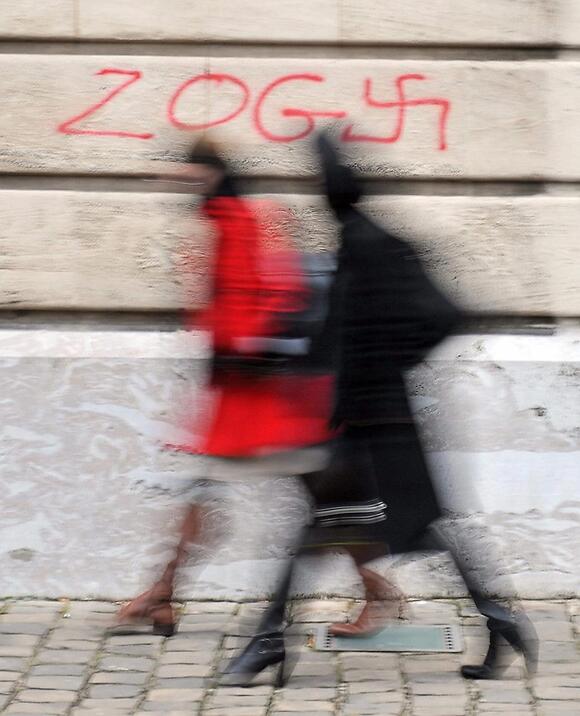
If you hadn’t heard the term before, “zog” might sound like a strange piece of internet slang or perhaps a video game character. But the term, it turns out, is shorthand for Zionist Occupied Government, and it’s a 1970s variation on the age-old antisemitic conspiracy theory alleging that a secret cabal of Jews runs the government, banks and media.
The acronym, which had historically remained relatively confined to neo-Nazi and white supremacist circles, made a sudden leap into the mainstream over the weekend. First, an account with the display name “Marxist Lynchist” posted in a tweet referring to Cori Bush’s primary loss, that “it appears we have a Zionist Operated Government.”
And far-left talking head, Max Blumenthal of Greyzone, also used it in a podcast. “I used to think ‘Zionist Occupied Government’ was an antisemitic term. Now I’m forced to see it as a pretty accurate description of the reality we live in,” he said. “One nation, under zog.”
Suddenly, the leftist internet fractured over one question: Is it antisemitic to say zog?
“Zog” originally gained popularity in neo-Nazi circles after its use in The Turner Diaries, a 1978 novel by Andrew Macdonald — a pseudonym for William Luther Pierce, the founder of white nationalist group National Alliance. Set in the year 2099, its heroes are the leaders of a white uprising that overthrows a nefarious Jewish-run government and wipes out all non-white people. It portrays Jews as puppet masters who, using their control over the government and media, dispatch queer people and people of color to attack white, Christian society.
The novel was widely-read in white nationalist circles, and inspired several violent attacks, including the 1984 assassination of Jewish radio host Alan Berg by The Order, a white supremacist group, and the 1995 Oklahoma City Bombing. Its roots are, unquestionably, racist, antisemitic and violent.
But in an era when it has become common in certain political circles to refer to the Israel Defense Forces, or IDF, as the Israeli Occupation Forces — the IOF — many people seemed to, in good faith, miss the history of the term, defending it as a shorthand for criticizing the Israeli government. Commenters on X argued that the term was anti-Zionist, not antisemitic. Besides, many argued, why quibble about language or antisemitism when Palestinians are dying?
But many others, however, including Contrapoints’ Natalie Wynn, an influential political YouTuber, decried the term.
“ No leftist should be using the phrase ‘Zionist occupied government’ for any reason,” she wrote on X . “That’s Ku Klux Klan, White Aryan Resistance, 90s Timothy McVeigh-ass Nazi jargon. ”
Those who questioned the use of zog, however, immediately faced backlash , and numerous people questioning their leftist bonafides. Weren’t they distracting from the struggle for Palestinian liberation — did they even support the movement at all?
The question comes down to the meaning of language and symbols. These things, of course, evolve over time; slang emerges, slurs like “queer” are reclaimed, symbols — even the swastika — often hold multiple meanings depending on the context. (The swastika is a symbol of peace in Hinduism and known as the Whirling Log in Native American indigenous art.)
But when the history and invention of a term is deeply rooted in antisemitism and conspiratorial thinking, can it ever be used without evoking that context?
That question came up recently in a controversial piece in Hyperallergic on Indigenous use of the Whirling Log in art. Though in the 1940s, several tribes signed a declaration formally agreeing to stop using the symbol because of its Nazi associations, more recently Indigenous artists have been trying to reclaim its peaceful origins.
But zog has no such background of peace; its existence depends on neo-Nazi conspiracies. It did not grow out of a legitimate critique of political support for Israel, but instead out of fear-mongering about race war. There is no context within which to rehabilitate or reclaim the term — particularly not when there are so many other terms without a neo-Nazi history or conspiratorial undertone that can be used to criticize U.S. support for Israel.
After all, our government is not occupied by Zionists; we elected them.
 Most Popular
Most Popular

Comments / 0